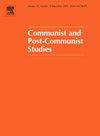Founding Myth, Institutional Adaptation, and Regime Resilience in China
IF 1.3
4区 社会学
Q3 INTERNATIONAL RELATIONS
引用次数: 3
Abstract
To explain the factors behind the regime resilience in China, this article focuses on the foundational and institutional resources that the Chinese Communist Party (CCP) accumulated in the earlier stages of regime development and their lasting influence on regime trajectory. At the stage of regime foundation, the CCP successfully constructed the founding myth of the party-state as the foundational resource to legitimize its rule. At the later stage of regime adaptation, institutional adaptation during the process of achieving modernization allowed the CCP to accumulate substantial institutional resources to further buttress the regime. While negotiating the space between state and society, the CCP regime demonstrated high capacity in granting more autonomy to market actors to accelerate growth while increasing the embeddedness of economic strata in the system through informal and formal institutional arrangements. When confronted with a serious crisis, the CCP was able to draw strength from the foundational and institutional resources to survive. This article argues that the CCP’s efforts in accumulating strength at the early stages of regime development continue to exert strong influence on China’s regime trajectory at later stages.中国的建国神话、制度适应与政权弹性
为了解释中国政权弹性背后的因素,本文重点关注中国共产党在政权发展的早期阶段积累的基础和制度资源,以及它们对政权轨迹的持久影响。在政权建立阶段,中共成功构建了党国的建立神话,作为其统治合法化的基础资源。在政权适应的后期,实现现代化过程中的制度适应使中共积累了大量的制度资源来进一步巩固政权。在协商国家与社会之间的空间时,中共政权表现出高度的能力,赋予市场参与者更多的自主权,以加速增长,同时通过非正式和正式的制度安排增加经济阶层在体系中的嵌入性。面对严重的危机,中国共产党能够从基础资源和制度资源中获得生存的力量。本文认为,中共在政权发展初期积累力量的努力,将继续对中国后期的政权轨迹产生强大影响。
本文章由计算机程序翻译,如有差异,请以英文原文为准。
求助全文
约1分钟内获得全文
求助全文
来源期刊

Communist and Post-Communist Studies
Multiple-
CiteScore
1.90
自引率
0.00%
发文量
23
期刊介绍:
Communist and Post-Communist Studies is an international journal covering all communist and post-communist states and communist movements, including both their domestic policies and their international relations. It is focused on the analysis of historical as well as current developments in the communist and post-communist world, including ideology, economy and society. It also aims to provide comparative foci on a given subject by inviting comments of a comparative character from scholars specializing in the same subject matter but in different countries.
 求助内容:
求助内容: 应助结果提醒方式:
应助结果提醒方式:


